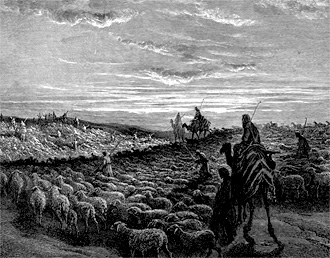Sunday, July 02, 2006
The Lord Does Something New (Genesis 12-15)

A rather strange and often glossed over story happens at the end of Noah’s life. Noah gets drunk and lays naked in his tent. Ham walks in on him, and tells his brothers, who promptly cover Noah up without peeking at him. Noah finds out, and curses Canaan (Ham’s son) to serve Shem and Japheth.
Abram’s story begins in the middle of his father Terah’s journey from Ur (one of the centers of civilization at the time) to the land of Canaan. Terah didn’t make it the whole way, but the Lord suddenly appears on the scene calling Abram to finish the journey. What’s more, he makes Abram a stunning promise, to give him exactly what the builders of the tower of Babel wanted for themselves – a great name, a mighty nation. And, as Abram is a descendent of Shem, the promised land will be taken from the sons of Canaan. God is enforcing Noah’s curse.
The next few chapters involve interesting anecdotes, including a bizarre episode in Egypt involving Sarah posing as Abram’s sister that foreshadows the exodus from Egypt (going there because of famine, plagues sent by God, sent away with urgency) and a battle to rescue Lot from the enemies of Sodom. Abram is blessed by the priest-king of Salem (the future Jerusalem, I assume) who offers him bread and wine in the name of “God Most High.” But all through this, something else is going on.
God is taking Abram through the land and constantly pointing things out. See this valley here? It will one day be filled with your descendents. God is letting Abram in on vast plans he has for him – a great nation that He himself is building. What’s more, in a mystical series of events, God seals the deal with a covenant. The nation itself wont be planted in the land for a while – the current inhabitants aren’t currently evil enough to deserve being displaced – but you know how these humans are: just give ‘em time.
God is finally getting his hands dirty in making something new. Up ‘til now, he has cursed man and the ground, preserved some of creation while destroying the most cancerous parts, and dispersed an arrogant group bent on upstaging Him. But he hasn’t begun the work of redemption until now.
And what does this redemption look like? A single man and his tribe traveling to a foreign land, with the promise that God will build him into a great nation. God needs a nation of people that he can make into something, to then bless all the families of the earth. All the “righteousness” he needs from Abram is the vision to see that God can pull this off.
Comments:
<< Home
So, assuming you're right about mythology in the beginning of the book, when do we switch from myth to biography/history/whatever-genre-it-is-we-switch-to? (in your opinion, of course)
There certainly isn't a hard cut-and-dry shift, as far as I can see, but if I had to make a distinction it would be from chapter 11 to 12. Things seem to be coming into a great deal more focus. However, it is clear that Genesis does have a unity that spans the whole thing (notice how every section is started by the phrase "these are the generations of").
I guess one of the biggest ways to tell the difference between mythology and history as inspired genres is to ask the question: did the author get his information by observation or other sources, or did he get it by the Holy Spirit guiding his imagination? And then ask youself if the two questions are mutually exclusive...
Another big thing here is that Abram is set in a specific time and place and geography, whereas before we are dealing with archtypes - giants of men living hundreds of years who are the founders of all the people groups on earth.
I think we should read it all like it happened, but when we get to Abram I think we can be a little more confident that we can start asking the historical questions effectivly.
But I'm no expert. It'd be nice to hear from someone who actually knew what he was talking about on this subject!
Post a Comment
I guess one of the biggest ways to tell the difference between mythology and history as inspired genres is to ask the question: did the author get his information by observation or other sources, or did he get it by the Holy Spirit guiding his imagination? And then ask youself if the two questions are mutually exclusive...
Another big thing here is that Abram is set in a specific time and place and geography, whereas before we are dealing with archtypes - giants of men living hundreds of years who are the founders of all the people groups on earth.
I think we should read it all like it happened, but when we get to Abram I think we can be a little more confident that we can start asking the historical questions effectivly.
But I'm no expert. It'd be nice to hear from someone who actually knew what he was talking about on this subject!
<< Home
Home
Who is Oyarsa?
Contact Me
Blog the Bible
Recent Comments
Archives
- June 2006
- July 2006
- August 2006
- September 2006
- October 2006
- November 2006
- December 2006
- January 2007
- February 2007
- March 2007
- April 2007
- May 2007
- June 2007
- July 2007
- August 2007
- September 2007
- October 2007
- November 2007
- December 2007
- January 2008
- February 2008
- March 2008
- April 2008
- May 2008
- June 2008
- July 2008
- September 2008
- October 2008
- November 2008
- July 2009
- August 2009
- January 2010
- August 2010
Recommended Books
